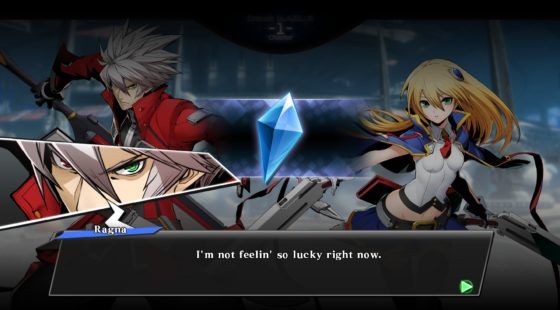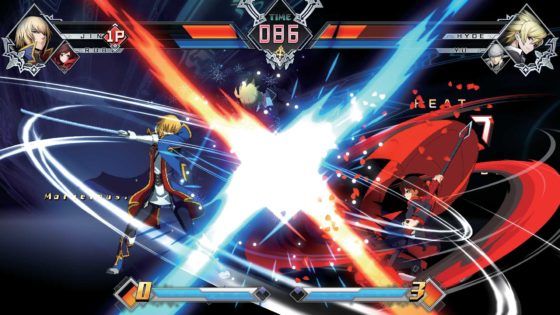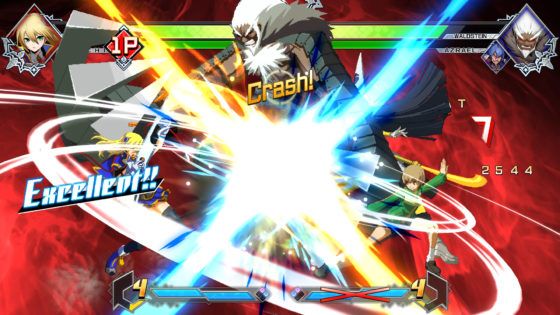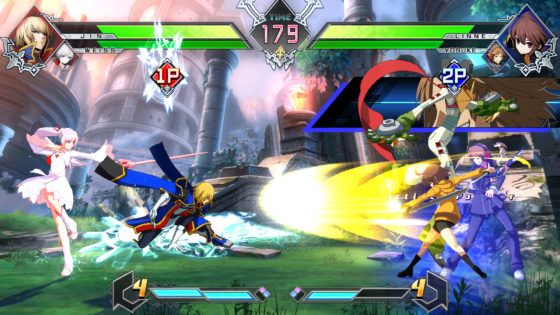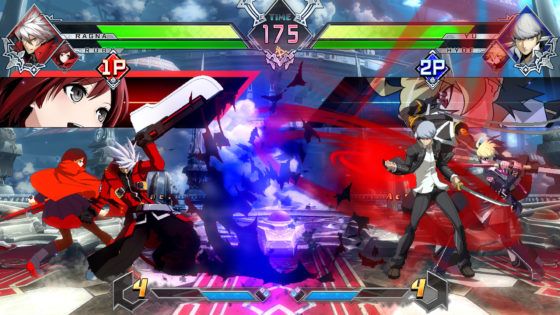With BlazBlue's storyline on its final leg and reaching its conclusion via its Central Fiction release, it was strange having to see Ragna and Jin take the center stage during this game's EVO 2017 reveal. Were we getting another BlazBlue game? Perhaps one with a longer name than what's already been laid out by Arc Systems Works so far? Apparently not. To my surprise, Persona 4 and Under Night In-birth's very own Yu Narukami and Hyde clashed right after the BlazBlue brothers' little banter. The echo of the crowd was music to my ears, growing louder and louder as more action scenes were delivered and of course the cherry on top was Ruby Rose's fighting game debut at the end of the trailer. It was surreal, seeing all these characters on the same backdrop, almost like the developers have already accepted that MUGEN was a thing. Alas, the wait is over and unfortunately, my wallet CAN'T ESCAPE FROM CROSSING FATE.
BlazBlue: Cross Tag Battle is a tag team fighting game consisting of characters from BlazBlue, Persona 4 Arena, Under Night In-birth and RWBY. The game breaks free from the convoluted mold BlazBlue is known for, instead sporting an easy to grasp system that makes it easier for newcomers while still catering a good amount of depth that rewards its more hardcore players.
The story is as basic as you would expect from a crossover title that features characters coming from very different worlds being chucked into the same dimension, with everyone being forced to partake in a tag tournament designed by a mysterious figure. I honestly considered this title to be a stop gap until the Arcsys's next big fighting game, but it appears that much thought has been poured into this game's many character interactions. Despite its lackluster pacing, the story's true gold stems from how each individual shines amidst the large cast of iconic characters. There's just that sense of wonder about how said character would react to said scenario that makes this crossover very satisfying. One snippet I found interesting was the banter between Gordeau and Ragna, with both being heavily dumbfounded about each person's respective source of power.
Gameplay: 9/10
BlazBlue: Cross Tag Battle's nitty-gritty comes from its newly formed tag system, which is highly reminiscent of the ones found in Capcom's Versus series (or Dragon Ball FighterZ if we're talking about relevance). Just as in other tag games, players can call in their partners at any given time, even making use of three distinct Partner skills that can act as combo extenders or utility in pressure and offense. This encourages a bit of team synergy and makes it all the more fun to experiment with the many combinations available to you. Over all the titles associated with the game, I feel it to be closest to Persona 4 Arena in terms of gameplay over the rest, with it's “Smart Combo System” tied to both its A and B buttons along with the ever trusty Reversal Action (Shoryuken/DP) being executed by pressing two buttons at the same time. Not to say that it's a very brainless fighting game, but it is an effective way to attract new blood without chugging mechanics and difficulty down their throat upon picking up a character. Remember, you have to learn two of them here.
The game makes use of three meters which, while different from their predecessors, are easily recognizable after a few rounds. Despite missing most of the features found in their respective titles, the game still presents itself with a respectable amount of offense, as well as the fast-paced action found in any respectable BlazBlue, Persona, or Under Night In-birth title. One new addition is the Clash Assault action, which hits your opponent with an instant overhead that deals a set amount of damage that's amplified by the precision of your input during its mini Quick Time Event (Getting "Marvellous" indicates a perfect input). There's also the Cross Combo option, which allows your partner to stay in the fray for an extended period of time to dish out some extra hits at the cost of depleting your tag bar.
Despite the game's intense set of attacking options, one thing that truly shined for me was its emphasis on defensive maneuvers. I for one think blocking shouldn't always equate to being at the losing end of the spectrum, but rather a setback leading to your turn on offense or reverting back to a neutral state. This makes the “Yomi” of offense and defense a bit more engaging as opposed to just staring and waiting for said blockstring to finish. A game with tag assists can be tricky after all, and there's only so much raw blocking can do when your opponents can use assists to cover holes in their offense, as shown by the recent nerfs in Dragon Ball FighterZ.
One useful defensive tool is the Reject Guard, which pushes your opponents away by pressing the Reversal Action while in the middle of blocking at the cost of one meter. I really enjoyed how this option was implemented, as mashing the Reversal Action button would equate to the player accidentally executing it, resulting in a hefty “unburstable” punish. There's also the Cross Burst, which tags in your opponent while getting hit by your opponent, cutting their combo and possibly escaping lethal damage. Bursting will drain your tag bar dry, and will disable tagging for a brief moment. Also keep in mind that the character you tag in isn't invulnerable and is susceptible too being punished if your burst was predicted in advance.
Perhaps the one that gets a lot of buzz is the Resonance Blaze, which acts as the game's comeback mechanic, giving you a damage boost and a gradually replenishing meter depending on the level of your Resonance gauge. I'm sure a lot of people are still on the fence about it, especially with the outrageous chip damage showcased by the likes of Jin and Yu, but it really isn't that bad when exercised in a more competitive setting.
Innovation: 7/10
While the idea of tag battles aren't exactly new in today's era, BlazBlue: Cross Tag Battle still offers enough to keep the experience fresh. Having three Partner Skills at your disposal instead of having to pick only one before a match makes for some great utility, as there's always the option of which Partner Skill to use at a given situation, whether you're attacking or on the defense.
The game's tag combo format is very satisfying to execute. There's just something about the formula that makes sense—so much, in fact, that one would be able to grasp both its controls and mechanics simply after a couple of bouts, if not a few minutes on the training menu. It makes combo experimentation feel a bit rewarding since you just tend to know what connects. It seems that a lot of tag-team fighting games are gunning for the more simplistic approach, and I'm all for it.
Learning Curve: 9/10
BlazBlue: Cross Tag Battle, for me, serves as a good entry level for anyone looking to get into fighting games. The “Smart Combo” system is well implemented, lowering the skill floor while still rewarding the more experienced players with a good amount of depth. Most of the inputs have also been simplified from DP inputs to a typical down + forward motion. Despite my love for the complexity and precision found in Arc System's lineup of games, it's nice to see something that breaks free from its convoluted systems to hook those who are in need of something simpler.
Graphics/Sounds: 7/10
Other than the RWBY cast, the game makes use of all the characters' existing sprites from their respective games. Some were said to have been reworked to fit the cast better, but I for one couldn't tell the difference. We're not looking at a set of Morrigan sprites, mind you, and most of the characters still hold up to today's standards despite sporting their 720p selves. Unlike the other versus titles like the Marvel vs Capcom franchise, however, some of the styles just don't jive when thrown together, with Under Night In-birth characters being less line-ey than the BlazBlue ones as an example. It's almost like Arc Sys just grabbed a MUGEN client and had their way with it. The HUD is comprehensible and easy on the eyes. Once the different meter's functions were brought to light, it was very easy to keep track of them in the middle of combat.
The soundtrack makes use of existing tracks from each franchise, as well as a couple of reworked ones to celebrate this crossover. The voice acting is top notch regardless of whether you're playing with ENG or JP dub. I've played BlazBlue more with the English voices, hence me sporting the same setting on this title. I think most of the voice actors did a splendid job in conveying their characters, especially in the semi-comedic segments of the story mode.
Value: 6/10
The value of this particular game is still a bit questionable for me. The Standard edition can be bought for a total of 49 USD, while the Deluxe edition, that carries a season pass for all future DLC characters can be bought for 69 USD—which for me has been one of the biggest forced purchases in any fighting game I've ever played. There was just something about the roster number that didn't sit right with me from the get-go. I've seen a lot of character passes in various fighting games, but this is the first time I've ever seen one that actually locks almost half of the roster to those who didn't buy the more expensive version. The character selection screen is even designed in a way that shows you just how much your roster lacks, almost like a mobile game of sorts. I love the game, don't get me wrong! But I've never had to pay this much for something outside novelty add-ons like extra music or a collectors edition statue. I don't know... I really think the standard edition deserves better.
I'd still recommend it to anyone who wants a new fighting game or existing fans of the franchises associated with it, but the price is definitely a disclaimer worth mentioning to future buyers. Go big or go home, unless you just want to play the game for a few days.
Overall: 7/10
BlazBlue: Cross Tag Battle is a fun fighting game that succeeds in taking three very different games (and a western anime) and reaching a compromise on what system to use. The controls feel fluid on both arcade stick and control pad, which hasn't been the case for many fighting games out there. Perhaps it's because of the simplified control-scheme, but it's a testament to the idea that bigger doesn't equate to better—or something of the sort. As I've stated earlier, I'm all for the streamlining this game has showcased so far. I'm still unsure about whether this game can compete with other fighting games on the market, or if it can even compete with the non-simplified titles it's trying to promote, but it really is a lot of fun to play. The game still needs a couple of balance changes, but it's definitely an issue that can be addressed in the future. I've also found its choice of starting characters to be a bit questionable, like Mori himself just chose 'waifus' over the more creative cast of characters in his BlazBlue line-up. Heck, maybe this is his ploy to get people to say that his Waifu cast reigns supreme. Maybe he organized this crossover simply to compare waifus with the other titles! He said he was interested in bringing Nier Automata's very own 2B over to the game. Don't do it Mori! 'Tis a battle you cannot win!
Joking aside, BlazBlue: Cross Tag Battle is a solid tag-team fighting game, and one that I think deserves your time and attention—provided that you buy the Deluxe version.
Pros:
Very easy to learn
Fun gameplay
Decent net code and fast matchmaking for ranked matches
Much thought has been put into the game's character interactions
Cons:
Less than half of the roster is paid DLC unless you buy the deluxe edition or a season pass
Streamlined gameplay may deter some players
Some questionable roster choices
